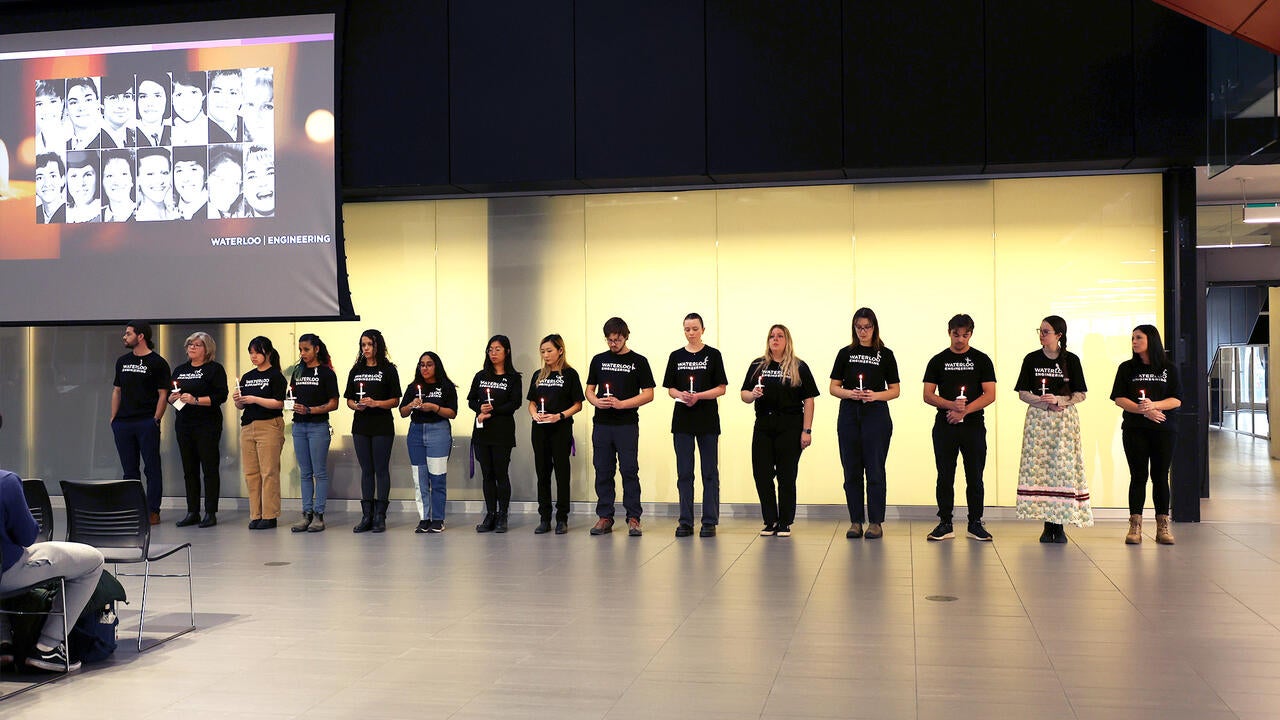
Waterloo Engineering students honour female victims
Campus community members remember and take action against gender-based violence

Campus community members remember and take action against gender-based violence
By Bernice Ma University RelationsDecember 6 marks the National Day of Remembrance and Action on Violence Against Women in Canada. Thirty-four years ago, 14 female engineering students were murdered at École Polytechnique de Montréal (now Polytechnique Montréal) in an act of gender-based violence, a manifestation of historical unequal power that creates barriers to limit the advancement of women and gender-diverse people.
Each year, the University of Waterloo hosts a ceremony of remembrance to reflect and respond to this horrific event. Dr. Mary Wells, dean, Faculty of Engineering began the ceremony by first acknowledging the enduring presence and deep traditional knowledge, laws and philosophies of Indigenous Peoples. “As engineers and architects, we are committed to meaningful action towards truth and reconciliation. It is only through this process that we can work towards a better future for generations to come,” Wells said who also discussed the importance of this day, and of integrating the voices of women in the field of engineering, in the Toronto Star.
Mary Robinson, associate dean, outreach, equity and diversity, who was 11 years old when the Montreal massacre occurred, recounted the violent act in 1989. “This attack is a graphic example of the violence that was perpetuated against women based on their gender that day, in engineering, in Canada. But gender-based violence has many forms, many that don't result in the making of a movie like Polytechnique or a Day of Remembrance, and it still persists today.”
Current master’s student and president of the Women in Engineering Undergraduate Student Committee, Andrea Chakma (BASc ’23) reflected on this day and the experiences she has as a woman in engineering. “Comments about our lack of intelligence or the way we work, assumptions that we aren't interested in hands-on work; we’re frequently getting paid to do the “female” jobs, such as taking meeting minutes. Running a potluck, dealing with sexist jokes and facing unwelcome advances are all things that we still see in this day and age, whether it's in the classroom or in the workplace.”
Chakma, who is also the Director Chair of the National Youth Council with Girl Guides of Canada, now works to empower girls and encourage young women to break down stereotypes by standing up to these behaviours, challenging social norms and educating others to end gender inequality.
Dr. Mark Hancock, chair of Management Science and Engineering also shared his journey towards action and began by acknowledging his privilege as a white, cisgendered, able-bodied, non-Indigenous person. “Change can only happen if people with privilege are part of the solution. Too often the work to fix problems, like sexism, is placed on those who are underprivileged, underprivileged, underrepresented, and in some cases, even suffering,” Hancock said. He stressed the importance of understanding that acts of violence against women are systemic and that men in engineering still have a lot of work to do. “A world where we work to fix these problems together, is actually a better world for all its inhabitants.”
Waterloo engineering students then came forward in honour of the 14 women to light a candle for each victim, followed by a moment of silence. This year, an additional 15th student was added to recognize the impact that this event had, and continues to have on our community.
Waterloo campus community members are encouraged to reflect on their role in preventing violence. That could include having conversations about the realities of gender-based violence or getting involved in on-campus groups, communities of practice, or non-governmental organizations. It’s important to normalize the ongoing conversation about gender-based violence and address structural violence at the University of Waterloo and beyond our campus.

Read more
Upside Robotics secures new funding to accelerate the future of sustainable farming

Read more
Redefining capstone learning by bringing students, faculty and community partners together to tackle real-world challenges

Read more
Here are the people and events behind some of this year’s most compelling Waterloo stories
The University of Waterloo acknowledges that much of our work takes place on the traditional territory of the Neutral, Anishinaabeg, and Haudenosaunee peoples. Our main campus is situated on the Haldimand Tract, the land granted to the Six Nations that includes six miles on each side of the Grand River. Our active work toward reconciliation takes place across our campuses through research, learning, teaching, and community building, and is co-ordinated within the Office of Indigenous Relations.